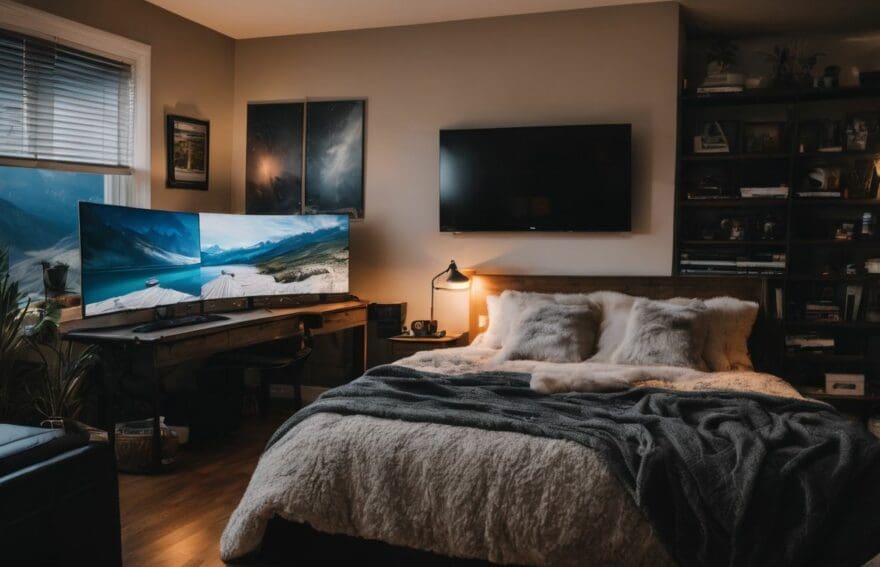The Importance of Sleep in Esports Performance

Updated On: November 09, 2025 by Aaron Connolly
Weary eyes and languid reflexes aren’t just a nuisance; they can very well be the difference between glorious victory and crushing defeat in our cherished esports battles. It’s a familiar plight, isn’t it? Straining to maintain concentration after countless rounds that stretch into the wee small hours.
Yet even the most dedicated virtual athletes must heed the call for some proper kip to stay on top of their game. Our article delves into how ample rest is not merely beneficial but essential, sharpening your judgement and hastening your response time in those critical moments.
Continue perusing for insights on incorporating sleep into your winning formula – it turns out catching those zzz’s might just unlock your peak performance level!
The Impact of Sleep on Esports Performance
Sleep plays a crucial role in esports performance, affecting cognitive function, physical health, and mental well-being. Lack of adequate sleep can lead to decreased reaction time, impaired decision-making skills, and increased risk of injury during gameplay.
Additionally, poor sleep can also negatively impact mood and overall game performance.
Cognitive Function
We understand the intense level of focus and quick decision-making needed in esports. Optimal cognitive function is key to staying sharp during long tournaments and practice sessions.
Good sleep improves reaction times, strategic thinking, and the ability to stay calm under pressure. It helps solidify new skills learned during gameplay, moving them from short-term memory to long-term storage.
Our brains need deep slumber for learning and memory consolidation. Esports players particularly benefit from this when mastering complex game strategies—it’s like hitting the ‘save’ button on your day’s work.
With stable sleep patterns, including efficient nonREM respiration rates, you’ll be ready to tackle your next gaming challenge with a clear mind. Now let’s consider how maintaining physical health through adequate rest contributes significantly to peak performance levels in competitive gaming environments.
Physical Health
Adequate sleep is vital for maintaining physical health in esports players. Optimal sleep duration and quality support muscle recovery, reduce the risk of injury, and enhance overall physical performance.
Esports athletes who prioritise restfulness experience improved reaction times, coordination, and endurance during gaming sessions. Furthermore, sufficient sleep contributes to better hand-eye coordination and motor skills, which are essential for success in competitive gaming.
Engaging in regular physical activity has also been shown to improve sleep efficiency and promote relaxation, contributing to rejuvenation after intense gaming sessions. By incorporating proper sleep hygiene practices into their routine, such as establishing a consistent bedtime and creating a comfortable sleeping environment, esports players can positively impact their physical health.
Emphasising the significance of adequate rest is fundamental for maximising both cognitive function and athletic performance in professional esports.
Mental Health
Optimal sleep directly correlates to mental health for esports athletes. Lack of sleep can lead to increased stress, anxiety, and irritability. It can also result in difficulties with decision-making and emotional regulation during high-pressure gaming situations.
Additionally, sleep deprivation can exacerbate symptoms of existing mental health conditions such as depression or ADHD among esports players. Ensuring adequate sleep is crucial for maintaining a positive mindset and overall psychological well-being while competing in professional gaming tournaments.
Sleeping on time helps us maintain peak performance in both physical ability and mental acuity while engaging in competitive gaming – which is essential for achieving success in the esports arena.
Factors Affecting Sleep in Esports Players
Gaming and increased sleep disturbances among esports players can be attributed to the high levels of screen time, as well as irregular gaming schedules. It is important for esports athletes to understand sleep recommendations by age group in order to improve their performance.
Gaming and Increased Sleep Disturbances
Esports players often face increased sleep disturbances due to their gaming activities. The immersive nature of gaming, especially in competitive scenarios, can lead to prolonged screen time and heightened arousal levels, making it challenging for gamers to unwind and fall asleep.
Additionally, exposure to blue light emitted by screens can disrupt the body’s natural circadian rhythm, further contributing to sleep disturbances among esports athletes. Moreover, the adrenaline rush from intense gameplay can linger long after a gaming session has ended, leading to difficulties in winding down and achieving restorative sleep.
The specific game genre also plays a role in affecting sleep patterns among esports players. Games with high-intensity action sequences or complex strategic decision-making may heighten cognitive stimulation even after gameplay has concluded.
Sleep Recommendations by Age Group
As passionate and novice gamers, we understand that sleep is a fundamental aspect of our overall well-being and esports performance. Different age groups require varying amounts of rest to function at their best. Below is a table highlighting sleep recommendations tailored to different age brackets, ensuring we all strive for the optimal sleep needed to excel in the gaming arena.
| Age Group | Recommended Sleep Duration |
|---|---|
| Teenagers (14-17 years) | 8-10 hours per night |
| Young Adults (18-25 years) | 7-9 hours per night |
| Adults (26-64 years) | 7-9 hours per night |
| Older Adults (65+ years) | 7-8 hours per night |
We should remember that achieving these sleep durations is crucial for both our cognitive functions and mental health. Our sleep patterns, including onset and efficiency, are stable when we follow these guidelines. Let’s also keep in mind that the gaming culture and the genre we immerse ourselves in may pose unique risks to our sleep quality. Moving forward, we’ll investigate the sleep characteristics of esports athletes, which play a pivotal role in their success.
Sleep Characteristics of Esports Athletes
A multi-national study found that esports athletes often have irregular sleep patterns and struggle with sleep quality, leading to increased fatigue and drowsiness during gameplay.
Understanding the specific sleep characteristics of esports players is crucial in developing tailored strategies to optimise their performance.
Multi-National Study
A multi-national study revealed that esports athletes from different countries exhibit similar sleep characteristics. These include stable sleep patterns and non-REM respiration rates, both crucial for physical and cognitive performance. The study highlights the universal importance of optimal sleep for esports players, irrespective of their cultural background or gaming preferences. Understanding these global sleep trends can help gamers prioritise adequate rest as an essential component of their training and overall performance.
The multi-national study emphasises the significance of prioritising sleep as a fundamental aspect of professional gaming across various cultures. It provides valuable insights into the relationship between sleep patterns and esports performance, underscoring the need for all players to focus on maintaining healthy and consistent sleeping habits.
Associations Between Sleep and Mood
Understanding the relationship between sleep and mood in esports players is crucial for optimising their performance. Factors such as stress, anxiety, and depression can have a significant impact on an individual’s quality of sleep, which in turn can affect their ability to focus and perform at their best during gameplay.
Cross-cultural issues related to sleep patterns and chronotype also play a role in determining how well esports athletes are able to manage their mood and overall mental health.
Cross-Cultural Issues
Esports players from different cultural backgrounds may have varying perspectives on sleep and rest. As an international industry, esports brings together individuals with diverse lifestyle habits and routines that can affect their sleep patterns.
Cultural preferences for gaming times, social activities, and work schedules can all contribute to differences in sleep practices among esports athletes. These cross-cultural variations emphasise the need for tailored approaches to promoting healthy sleep habits within the esports community.
Professional gamers from different parts of the world may face unique challenges related to maintaining a consistent sleep schedule. Factors such as varying time zones, cultural traditions around meal times, and societal expectations concerning leisure activities can impact how esports players prioritise their rest.
Chronotype and Performance
Understanding your chronotype can significantly impact your performance in esports. Chronotype refers to your body’s internal clock, determining whether you are a morning person or a night owl.
This plays a crucial role in regulating the timing of when you feel most alert and when you experience peak levels of performance. As passionate gamers, recognising your individual chronotype can help tailor your sleep schedule for optimal gaming sessions and competition readiness.
Additionally, being aware of nap opportunities that align with your chronotype can provide a quick boost to cognitive function and mood. Novice gamers should note that understanding their own rhythm is essential for maximising performance during peak gaming hours, ensuring that they are well-rested at critical game times.
Clinical Implications and Conclusion
Sleep plays a crucial role in the performance of esports athletes, impacting cognitive and physical abilities. Esports players should prioritise maintaining stable sleep patterns for optimal performance.
Adequate sleep is essential for recovery, memory consolidation, and overall success in the competitive world of esports. Prioritising healthy sleep habits can significantly enhance mood and overall athletic performance.
Understanding the impact of restorative sleep is vital for professional gamers to achieve peak performance levels.
FAQs
1. Why is sleep important for esports athletes?
Sleep is crucial for professional esports athletes because it helps them stay focused, react quickly, and perform at their best during competitions.
2. How does lack of sleep affect esports performance?
When esports professionals don’t get enough sleep, their reaction times slow down and they may struggle to make smart decisions in games.
3. Can better sleep lead to winning more in esports?
Yes! Better sleep can greatly improve an esports player’s performance by boosting their concentration and decision-making skills which can lead to more wins.
4. What are some tips for improving sleep for esport players?
Esports athletes should aim for a regular bedtime schedule, create a restful environment free of screens before sleeping, and avoid caffeine or heavy meals close to bedtime.


